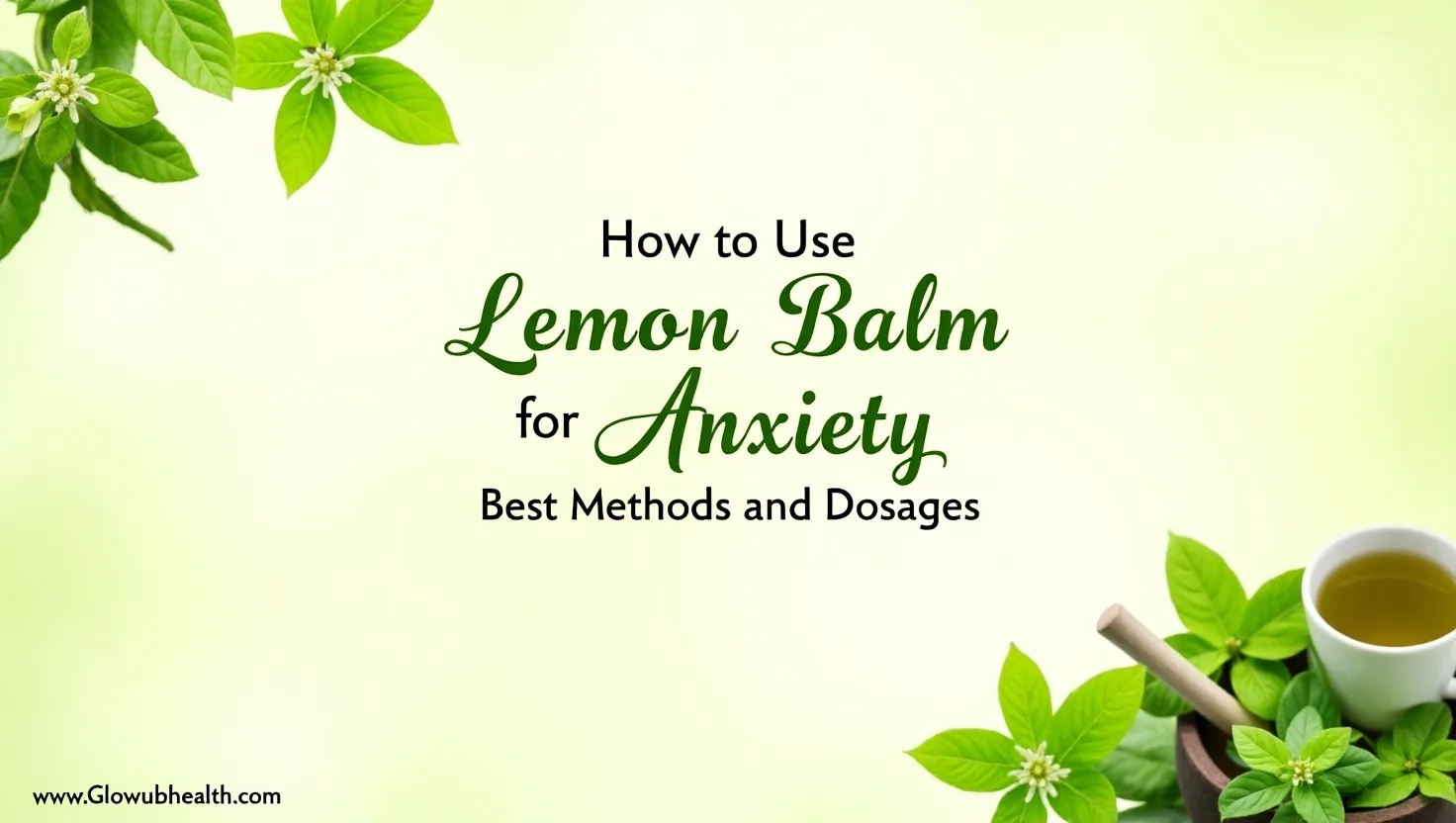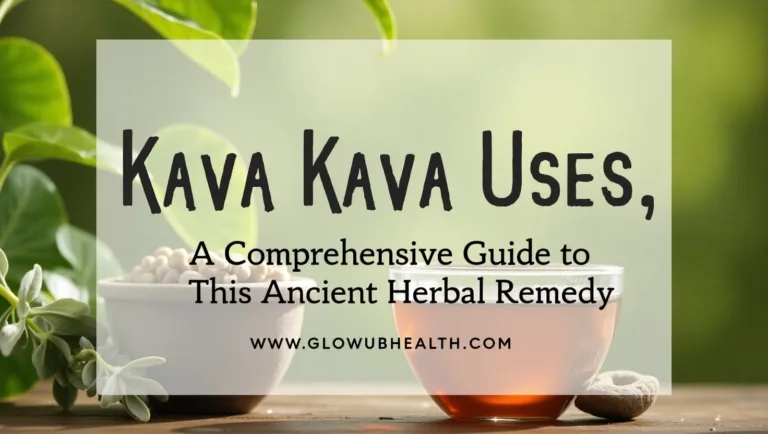How to Use Lemon Balm for Anxiety : Best Methods and Dosages
Anxiety is one of the most common mental health challenges affecting millions of people worldwide. While pharmaceutical treatments exist, many individuals seek natural alternatives. One such remedy is lemon balm for anxiety, an herb with centuries of use in traditional medicine for calming the mind and improving overall well-being.
Lemon balm (Melissa officinalis), a member of the mint family, has been praised for its soothing effects on the nervous system, making it a popular choice for managing anxiety and stress. But how exactly should you use it? In this guide, we’ll explore the best methods and dosages for effectively using lemon balm to ease anxiety, backed by scientific research and practical tips.
The content in this article is for educational and informational purposes only. It is not intended as medical advice, diagnosis, or treatment. Always consult with a qualified healthcare provider before starting any new herbal supplement, especially if you are on medication or have a pre-existing health condition.
What Is Lemon Balm and How Does It Help Anxiety?
Understanding the Lemon Balm Plant
Lemon balm is a perennial herb with a mild lemon scent and a history of use dating back to ancient Greece and Rome. The herb is commonly used in teas, extracts, capsules, and essential oils.
How Lemon Balm Works for Anxiety
Lemon balm is known for its calming and anti-anxiety properties, primarily due to its active compounds:
- Rosmarinic acid – Helps inhibit enzymes that break down neurotransmitters like GABA, leading to a calming effect.
- Flavonoids and terpenes – These have mild sedative effects that promote relaxation and reduce stress.
- Caffeic acid and eugenol – Offer anti-inflammatory and neuroprotective benefits.
Studies suggest that lemon balm for anxiety works by increasing GABA (gamma-aminobutyric acid) levels in the brain, which helps regulate mood and reduce stress responses. Additionally, lemon balm for sleep is often used alongside anxiety treatments since it improves sleep quality, indirectly reducing stress.
Best Methods to Use Lemon Balm for Anxiety
1) Lemon Balm Tea (Best for Daily Relaxation)
How to Prepare:
- 1–2 teaspoons of dried lemon balm leaves
- 1 cup of boiling water
- Steep for 5–10 minutes, strain, and drink
Best Time to Take:
- In the morning for a calm start to the day
- In the evening for lemon balm for sleep benefits
2) Lemon Balm Tincture (Best for Fast-Acting Relief)
A lemon balm tincture is a concentrated liquid extract made by soaking the leaves in alcohol or glycerin.
How to Use:
- Take 30–60 drops (about 1-2 dropperfuls) in a small amount of water or juice
- Use up to three times per day for anxiety relief
3) Lemon Balm Capsules (Best for Consistent Dosage)
For those who prefer a standardized dosage, lemon balm capsules offer a convenient option.
Recommended Dosage:
- 300–600 mg per day for general anxiety relief
- Can be taken once or twice daily, depending on individual needs
4) Lemon Balm Essential Oil (Best for Aromatherapy & Topical Use)
Lemon balm essential oil can be used for inhalation therapy or topical application.
How to Use:
- Aromatherapy: Add 3–5 drops to a diffuser
- Topical application: Dilute with a carrier oil (e.g., coconut oil) and apply to pulse points
- Bath soak: Add 10 drops to warm bathwater for a calming effect
Scientific Evidence Supporting Lemon Balm for Anxiety
Several studies support the effectiveness of lemon balm in reducing anxiety:
- A 2014 study in the journal Phytomedicine found that 600 mg of lemon balm extract significantly reduced anxiety and improved mood in participants.
- Research published in Neurochemical Research showed that lemon balm enhances GABA activity, leading to relaxation and stress relief.
- A 2021 clinical trial demonstrated that a combination of lemon balm and valerian root improved anxiety symptoms and sleep quality.
Lemon Balm Dosage for Anxiety Relief
| Form of Lemon Balm | Recommended Dosage |
|---|---|
| Tea | 1–2 teaspoons per cup, up to 3 times daily |
| Tincture | 30–60 drops, up to 3 times per day |
| Capsules | 300–600 mg, 1–2 times daily |
| Essential Oil | 3–5 drops in a diffuser, or diluted for topical use |
Factors That Influence Dosage
- Severity of anxiety – Mild cases may require lower doses, while severe anxiety may benefit from higher doses within the recommended range.
- Body weight and metabolism – Individuals with a higher body weight may require slightly increased amounts.
- Combination with other herbs – Lemon balm is often paired with valerian root, passionflower, or chamomile for enhanced calming effects.
Possible Side Effects and Precautions
Lemon balm is generally safe, but excessive use can lead to:
- Drowsiness (especially in high doses)
- Digestive issues like nausea or bloating
- Lowered blood pressure (caution for those with hypotension)
- Possible interactions with sedatives or thyroid medications
Who Should Avoid Lemon Balm?
- Pregnant or breastfeeding women should consult a doctor.
- Individuals taking sedatives, antidepressants, or thyroid medication should seek medical advice before use.
Personal Experience: How Lemon Balm Helped Me
As someone who struggles with occasional anxiety, I started using lemon balm tea as a natural remedy. Within a few weeks, I noticed a significant improvement in my stress levels and sleep quality. I also experimented with capsules for daytime use, which helped me stay calm during high-pressure situations. Combining lemon balm for anxiety and sleep made a huge difference in my daily routine.
Conclusion: Is Lemon Balm Effective for Anxiety?
Lemon balm is a powerful natural remedy that can effectively reduce anxiety, promote relaxation, and improve sleep quality. Whether used as a tea, tincture, capsule, or essential oil, it provides a gentle, non-habit-forming alternative to pharmaceutical treatments.
Key Takeaways:
- Lemon balm for anxiety works by increasing GABA levels and reducing cortisol.
- Different methods include tea, tinctures, capsules, and essential oils.
- Dosage varies based on individual needs, but 300–600 mg daily is effective.
- It is generally safe, but consult a doctor if taking medications.
For those looking for a holistic approach to anxiety relief, adding lemon balm to your wellness routine could be a game-changer.
Have you tried lemon balm for anxiety? Share your experience in the comments!
FAQ
1. How quickly does lemon balm work for anxiety?
Lemon balm typically starts working within 30 minutes to 1 hour, depending on the form used. Tinctures and teas tend to act faster, while capsules may take longer to show effects.
2. Can I take lemon balm every day for anxiety?
Yes, lemon balm is generally safe for daily use, but it’s best to start with a lower dosage and adjust as needed. Long-term use should be monitored to avoid potential side effects like drowsiness.
3. What is the best way to use lemon balm for anxiety?
The best method depends on your needs:
Tea is great for mild, daily relaxation.
Tinctures provide quick relief.
Capsules offer a precise and consistent dose.
Essential oils work well for aromatherapy and topical use.
4. Can lemon balm help with sleep-related anxiety?
Yes, lemon balm for sleep is commonly used alongside anxiety treatments. It promotes relaxation and improves sleep quality by increasing GABA levels in the brain.
5. Are there any side effects of using lemon balm?
Lemon balm is generally safe, but possible side effects include:
Drowsiness
Nausea or digestive discomfort
Lowered blood pressure (caution for those with hypotension)
6. Can I mix lemon balm with other herbs for anxiety?
Yes! Lemon balm pairs well with:
Valerian root (enhances relaxation and sleep)
Passionflower (supports stress reduction)
Chamomile (soothing and calming effects)






